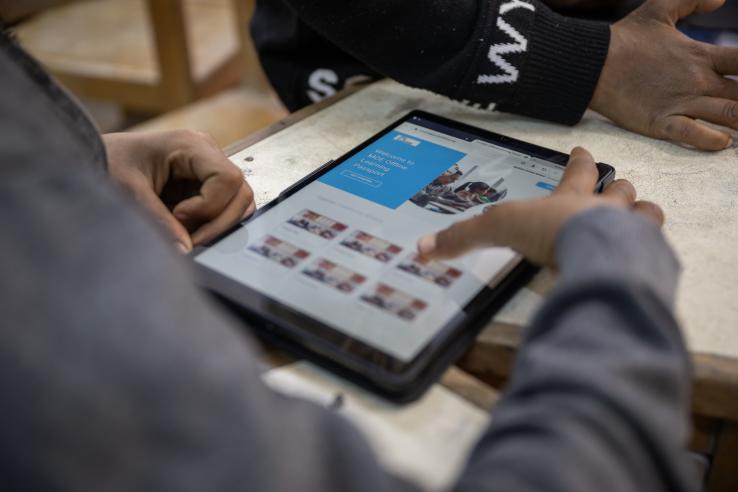Egypt, a nation steeped in ancient wisdom and cultural heritage, is undergoing a remarkable transformation — one that is redefining the very foundations of its educational landscape.
In the heart of this digital revolution lies a booming EdTech ecosystem, where innovative startups are harnessing the power of technology to reshape the learning experience for an entire generation.
A startup like PraxiLabs is pioneering the use of virtual reality (VR) technology to revolutionize science education. By creating immersive virtual science labs, PraxiLabs is making hands-on experiential learning accessible, engaging, and scalable for educational institutions across Egypt.
These virtual labs not only provide students with a highly realistic and interactive simulation of scientific experiments, but they also incorporate adaptive and personalized learning elements. Leveraging the latest advancements in AI and data analytics, PraxiLabs’ virtual lab experiences are customized to each student’s learning style, prior knowledge, and pace of progress.
By making virtual science labs affordable and easily deployable, PraxiLabs is empowering schools and educational institutions to supplement traditional classroom instruction with cutting-edge, technology-enabled learning experiences.
The rise of EdTech in Egypt, however, is not merely a grassroots movement; it is a deliberate and strategic effort spearheaded by the government.
Recognizing the crucial role that STEM (Science, Technology, Engineering, and Mathematics) education and coding skills play in shaping the future workforce, Egyptian authorities are heavily encouraging students to become more immersive in these fields.
This strategic focus on STEM and coding is not just a passing trend, but a deliberate effort to equip the next generation of Egyptians with the skills and mindset necessary to thrive in the rapidly evolving digital economy.
Another example is iSchool Egypt, which goes beyond just core academic subjects, offering students access to some AI and coding courses starting from the K-12 level.
One other shining example of Egypt’s EdTech revolution is the Educate Me Foundation, a non-profit organization established in 2010, that is using technology to provide quality education to underserved communities. Through their flagship program, the Educate Me Learning Centers, they have established over 20 digital hubs across Egypt, equipped with state-of-the-art learning tools and personalized curriculums.
Another pioneering EdTech initiative is the STEM Schools project, a collaborative effort between the Egyptian Ministry of Education and the private sector. These specialized schools dotted across the country, are designed to nurture the next generation of scientists, engineers, and tech innovators by increasing student interest, participation, and achievement in science and mathematics, and building the capacity of a highly qualified cadre of STEM professionals and provide opportunities for training and sustained, intellectually rigorous professional learning.
At STEM Schools, students engage in a rigorous curriculum that goes beyond traditional learning, emphasizing hands-on experimentation, project-based learning, and the seamless integration of emerging technologies. From 3D printing and robotics labs to data analytics workshops, these institutions are equipping students with the skills and mindset necessary to tackle the challenges of the future.
However, the transformation within the Egyptian educational landscape extends far beyond the confines of STEM and coding. The government’s emphasis on digital literacy and the integration of technology across all subjects is paving the way for a more holistic and well-rounded educational experience.
One such initiative is the “Digital Transformation of Education” program, which is spearheading the deployment of interactive whiteboards, tablets, and e-learning platforms in classrooms across the country.
This shift towards digital learning resources not only enhances the learning experience, additionally, it ensures that students from all socioeconomic backgrounds have access to the same high-quality educational materials.
During the height of the crisis, the government’s swift deployment of online learning platforms and the seamless transition to remote education ensured that students’ learning journeys remained uninterrupted, serving as a model for other nations seeking to navigate the complexities of the new normal.
However, while innovative startups like PraxiLabs and iSchool Egypt are leveraging cutting-edge technologies to transform learning, issues of accessibility and equity remain a concern.
Many schools, particularly those outside major urban centers, struggle with limited access to the necessary hardware, reliable electricity, and properly trained staff to effectively implement these digital solutions. This has led to a widening gap in the quality of education between well-resourced schools in Cairo and those in more remote or underprivileged areas.


Comments (2)
[…] Read More […]
[…] post Egypt’s EdTech Revolution: Transforming the Future of Learning first appeared on Egyptian […]